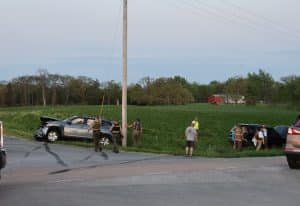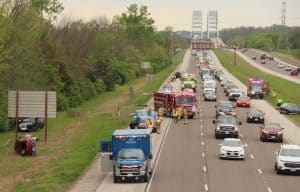CHS construction costs clarified
The Columbia School Board met Thursday for its final meeting of the year, touching on a variety of items including curriculum and library matters while also expanding on Columbia High School construction discussion from November.
Talk concerning the renovations being made at CHS came toward the end of the meeting, with Columbia Superintendent of Schools Chris Grode offering a brief update on where construction is at this point.
“We are waiting for them to pour the slab of concrete,” Grode said. “Mid-January is when the steel is supposed to arrive, and so we’re told by the end of January and February, you’ll really start to see that building pop up.”
The project is currently in the midst of its first phase which includes the addition of several classrooms and administrative spaces as well as an auditorium.
Phase two will see construction of a competition gym for the facility while phase three will center around renovations and improvements to the current building.
Following Grode’s update that groundwork for phase one was approaching its conclusion, Columbia School Board President Greg Meyer offered his thoughts on some of the talk going around in the community about the state of the project’s budget.
As previously reported, board member Adam Hemken led facility study discussion last month to explain that some of the first informed estimates for phases two and three of the project came back around $3 million-$5 million higher than anticipated.
Talk in that November discussion largely concluded with members of the board considering making increases to the budget as necessary while cutting components that don’t require immediate attention – for example, ensuring a green room for the auditorium is constructed while planning to outfit it as desired at a later date.
Meyer and Hemken – who have both played major roles in the oversight and management of the renovation project – also questioned last month how elements of phase three were estimated to be so expensive.
Last Thursday, Meyer expanded on what was said at the previous meeting, noting he has seen some apparent misinformation or confusion about the project, mostly online.
He said though the situation has been described as the project being over budget – the previously mentioned article on the November board meeting used the phrase – that doesn’t exactly capture the situation.
“We really are not ‘over budget,’ and I know it’s semantics, but basically the costs were higher than we were expecting,” Meyer said.
Hemken later in the discussion reiterated Meyer’s sentiment.
“It’s not really over budgeted,” Hemken said. “The forecasted numbers are higher, but we’re still within our budget to obtain the goal of being at a net zero or less tax. I think that’s where the difference is. The numbers are higher than original, but that doesn’t mean that we’re overbudgeted and it’s going to exceed the current tax cap, the current tax rate.”
Meyer also once again questioned how high estimates for phase three have come in, further noting the project doesn’t have a final cost at the moment.
Besides clarifying the matter of project estimates, Meyer also offered a general overview of the project’s budget.
“When we started this entire project, we evaluated a brand new high school versus everything else,” Meyer said. “A brand new high school, our numbers were $180 million to do that high school. We’re looking at $50 million for what we’re doing. So that’s a huge savings overall for the district. In addition, we have our multipurpose field that we can reuse, we have the greenhouse, we have the parking lot, we have the roads. A lot of that stuff we’re reusing, so it made a lot of sense to do what we’re doing.”
He further explained the work that’s been done when it comes to keeping the budget in line, with he and Hemken having previously worked out a footprint for the project that would allow the school to best make use of the current facility.
Meyer acknowledged that costs for phase two seem to simply be higher than anticipated and reiterated the sentiment from November about completing infrastructure so finer renovations can be made at a later date.
“What we’re trying to do is set up the district for the future,” Meyer said. “We’re trying to get all the infrastructure really done so the things that we can’t afford right now, we can easily add later on so it’s not a huge expense. So we’re whiteboxing a couple rooms and that sort of thing to achieve that goal.”
A phrase Meyer and Hemken used a number of times during this discussion was that the board and the district are trying to “live within their means” with the payment of this project, keeping the tax rate where it is.
Concerning the tax rate elsewhere in the meeting, the board approved the tax levy for 2024, asking for an additional 4.95 percent increase to last year’s levy as it did in 2023.
According to Grode after the meeting, the district’s requested tax levy for 2024 stands at $15,985,654.
Additional action items addressed by the board included approval of early graduates – 25 students are graduating this winter – the 2024 teacher and administrator salary and benefits report, and the second reading of board policies Press Plus Issue 117.
Another policy matter addressed by the board was approval of the first reading of board policy 6:230 concerning instruction library media.
As was explained at the meeting, this approval places the district alongside a number of other districts in confirming that it will not be adhering to national library principles and the American Library Association’s Library Bill of Rights, providing the district more local discretion on what media items are put into district libraries.
A law signed by Gov. JB Pritzker last year established that those libraries who do not adhere to the aforementioned bill of rights will have grant funding withheld.
Grode explained that Columbia – which, as he said, has previously received grants of about $1,000 – and other schools opted to disregard the bill of rights in order to maintain local control of district library contents.
“As a superintendent of schools, I’ve always worked for organizations that have local control, local school boards,” Grode said. “The library grant this year, there were a lot of districts that did not sign up for the library grant because to do that you needed to say that you are following the national library standards.”
The board also approved the Horizon Education ACT Assessment, which Columbia Assistant Superintendent of Schools Amanda Ganey discussed in her monthly report.
Funded through a grant, this would essentially be an ACT prep program which Ganey noted to be important given Illinois’ switch from the SAT to the ACT for its annual evaluations as well as the value placed on the ACT by many colleges.
Also approved by the board was the addition of Production Tech and Beginning Electricity as course offerings at CHS.
It was noted that these classes would take place at Dupo High School, adding to Columbia’s existing program partnerships with other districts such as with its EMR and German programs.
This item also pertained to some of Ganey’s December report as she spoke about College and Career Pathway Endorsement as the district is looking to further opportunities for students to study trade careers and quickly join the workforce out of school.
“We have a lot of dual credit, college credit opportunities, but really we don’t have those transitional pathways, and that is what a CCPE plan would do,” Ganey said. “It would give a level one course, a level three or four course, and then it would put an endorsement on their transcripts to hopefully make them more marketable in possibly a vocation of their choice.”
Also in her report, Ganey offered district shoutouts to CHS math teacher Bethany Grandt, Columbia Middle School paraprofessional David Jackson, Eagleview Elementary food services staff Krystahl Beshears and Parkview Elementary secretary Robin Siler.






